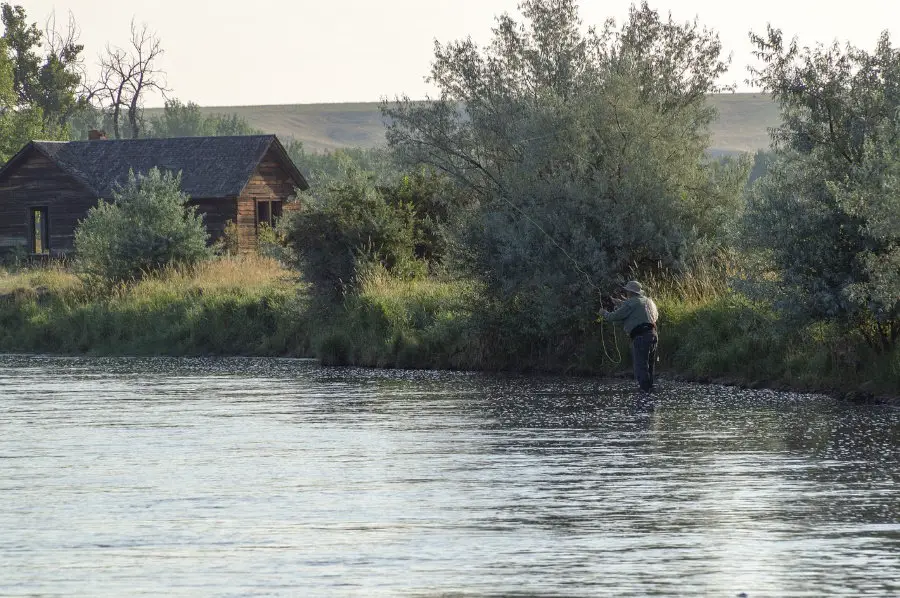
It’s the perfect weather to camp, fish, and enjoy a day in nature, but what if there’s no time to secure a license before you head out to the water?
Can you fish without a fishing license? Every state requires a fishing license to fish in public bodies of water. Every state varies in fines and restrictions. Types of licenses available could depend on the type of bodies of water available in the region and may be given among different categories.
Before you head into the water, you might want to make sure you have a fishing license in hand and the seasonal laws for fishing covered. This might sound overwhelming, but we’ve got a few fishing license facts and tips here to help you understand it and get you closer to the water faster!
Can You Fish Without a Fishing License?
The simple answer to the question is no. Well, sure you can, but will there be a penalty? Yes, almost every time, no matter where you are. If the water is public, you need to be licensed to fish from it.
Every state in the United States requires a fishing license to fish in any public bodies of water; this includes anything you are pulling from the water: fish, mussels, clams, crayfish, or any other aquatic life.
Keep note, though, that each state will have a different type of penalty for a missing license. They will also regulate different types of licenses depending on the type of fishing that is available in the region.
Types of Fishing Licenses
There are several types of fishing licenses available, depending on the classification of fishing obtainable. Most importantly to consider, most licensing processes and procedures will differ according to the following classifications. We’ll cover each in a little detail below.
- Resident vs. Non-resident
- Saltwater vs. Freshwater
- Recreational vs. Commercial
Resident vs. Non-resident
Most likely, if you are a resident of the state in which you are obtaining the fishing license, you will get a discounted price for a fishing license. When purchasing, you will be required to show proof of residency. Extended licenses, annual, and lifetime licenses are often only offered to residents.
That being said, if you are a visitor, you are still able to buy fishing licenses, just not at the discounted price. There will also be restrictions to the time of validity and will need to be renewed accordingly. Most states will not offer annual or lifetime licenses to visitors.
Saltwater vs. Freshwater
Your license will be specific for either saltwater or freshwater fishing. Keep this in mind as to where you can fish, and what you can fish will depend on this category.
If you are planning to go to a state that has both saltwater and freshwater, you need to pay special attention to where you are fishing to make sure you are fishing accordingly.
What does it mean to fish in freshwater?
Freshwater fishing is inland fishing. Some examples of great freshwater fishing are trout, grayling, and sculpin.
For these fish, you can go fishing in the great and deep rivers of Colorado, Utah, and Wyoming.
Other additional states that offer freshwater fishing but famous for magnificent bass and catfish fishing will be Texas, Oklahoma, and Missouri.
What does it mean to fish in saltwater?
Saltwater fishing is in coastal waters.
Commonly, if you want to catch some tuna (yellowfin, blackfin, etc.), you will want to head to some saltwater fishing in Florida.
Other saltwater fishing such as varieties of snappers and groupers of the Gulf of Mexico.
Recreational vs. Commercial
If you are feeling like turning fishing into a profitable business, you may want to consider what licenses you will need to do commercial fishing. If you intend to catch fish to sell to other people, you will need a commercial license.
What If You Forget Your Fishing License?
If you forgot your fishing license, technically, a game warden will be able to look up your information if he contacts the head office to pull up the information.
That being said, they don’t have the information in hand. Keep in mind that you are in the wild, and that phone services or database access can be limited for the game warden and yourself.
If you want to be on the safe side, you can go to a close-by fishing or outdoor store to replace your card.
In places where fishing is more common often, say at a campground deep in the mountains, you might be able to find fishing licenses at gas stations.
Replacing your license before heading out could be a cheaper option than risking a ticket.
Pro tip: Make copies of your fishing licenses and keep them throughout your fishing and camping gear. Keep one in the boat, your wallet, car, and pockets. Being exposed to water, you are also prone to losing one throughout your day. Here’s an article we wrote sharing what to do if your license gets wet.
How to Buy Fishing Licenses
Online
There are convenient options online to purchase fishing licenses. Make sure you are purchasing from the official state department websites. Whether it’s for purchasing, replacing, or renewing, official state websites will have an option for you.
Online options will require a credit or debit card payment options, and your license is usually available immediately after the transaction. There will be options to print or send to your home for your convenience.
By Phone
If you want to talk to a person and purchase a fishing license, most states will offer a representative to speak to via phone. You will have to provide your information and pay for it with your credit or debit card.
Your license will be available after the purchase and will be sent to your mailing address.
In-Person
There are plenty of places throughout states where you can purchase your fishing license and you can find authorized license agents.
If that’s a bit of a challenge, you can stop by any of the following:
- Sporting stores
- Outdoors store
- Fishing equipment store
- Local gas stations near national parks
Local department offices should also provide fishing license services.
Along with your identification, you will need to show proof of your residency for your purchase. Most places should take cash or card payments.
By mail
Mailing in an application is another option. You will have to look into the state’s options to apply and pay the fees for a license.
Mailing could be an inconvenient option as there could be a lag of the application and fees to be received by the state’s representatives, be approved, then for licenses to be mailed back.
Seasonal Changes in Laws and Limits
As important as it is to have the proper license or a fishing license at all, it is very important to know the limits of fishing in the county.
Assuming that you are a magnificent angler or get lucky, you will be catching fish that are controlled under the state’s regulations. These limits vary depending on the season and sometimes per county.
Their regulations are usually for fish in possession. Most counties do not consider fish that is caught and immediately released to have been in possession. Though, any fish that is on any type of hanging device is considered to be in the angler’s possession.
For all states, all fish in possession must be within the given daily bag limit and length limit. The definition of the length is strictly stated on their websites, and their daily bag limits will be mentioned.
The key information is that the bag limits and length limits will vary.
- The first variable will depend on the region. Every state has a different limit depending on their geographical region and their year’s season.
- The second variable will be the type of fishing. If you are in a state that has both inland and coastal fishing, you will have to check the bag and length limit for either type of fishing (whether you are fishing in saltwater vs. freshwater).
Within these two parameters, the bag and length limits will again vary with the seasonal changes.
Needless to say, it’s important to keep up to date with the local game warden bureau before heading out. As long as you check the local bureau before fishing, you should have all the information for these regulations.
